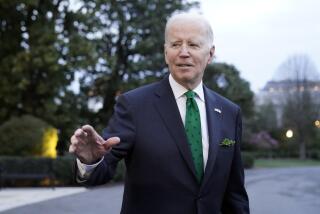Opponents, Supporters Predict Victory : Pay Hike Battle Brews in Congress
- Share via
WASHINGTON — President Reagan’s endorsement Friday of a 50% pay increase for members of Congress, federal judges and top executive branch officials is certain to set off a full-scale political brawl on Capitol Hill early next month.
Both opponents and supporters of the proposal expressed confidence that their side would prevail in the parliamentary maneuvering that will culminate on Feb. 9, when the pay hike will take effect unless both houses of Congress have voted it down.
Although the Senate is almost certain to reject the raise, House Democratic leaders have acknowledged that they are hoping to keep the issue from coming to a vote before the deadline, much as they did a year ago when Congress received a 15.6% pay increase.
Anti-Raise Efforts Pledged
But opponents of the raise vowed not only to lobby strenuously for its rejection, but also to mount a repeal effort if both chambers fail to vote against it within the prescribed 30-day period for taking such action.
“The public is not going to give up after 30 days,” said David L. Keating, executive vice president of the nonpartisan National Taxpayers Union, which opposes the raise. “They will just get more angry at congressional double-dealing on the pay raise issue.”
With the financial stakes so high and the battle lines so clearly drawn, congressional leaders predicted that it would be one of the most bitter and volatile fights Congress has seen in many years. “We’ll be in the eye of the hurricane, even though 80% of the people affected by this do not serve in Congress,” said Rep. Vic Fazio (D-Sacramento).
The pay increase, which was recommended initially by a presidential commission, would give $135,000 a year to members of Congress, judges and federal officials at the level of deputy secretary. Cabinet officers would receive $155,000. The President’s pay would rise to $300,000, but not until 1993.
Letter Sent to Congress
Reagan announced his support of the pay hike in a letter sent to members of Congress on Friday and pledged to incorporate the raise into the proposed fiscal 1989 budget that he will submit to Congress on Monday. He said the increase is necessary to assure that government service does not become “the province only of the wealthy.”
In exchange for the raise, Reagan called on Congress to permanently prohibit its members from accepting honorariums from special-interest groups. House members now can keep honorariums equivalent to 30% of their $89,500 annual salaries, and senators can accept up to 40%.
House and Senate leaders already have announced that they will bring legislation banning honorariums to a vote Feb. 10 if the 50% raise takes effect on the previous day. Fazio and another Californian, Rep. Jerry Lewis (R-Redlands) have been chosen by House leaders to work with members of the Senate in developing legislation banning honorariums that is acceptable to both chambers.
Senate Rejection Expected
In the Senate, Majority Leader George J. Mitchell (D-Me.) and Minority Leader Bob Dole (R-Kan.) have pledged to schedule a vote on the pay raise in early February. Members of the Senate, about one-third of whom are millionaires, are expected to vote against it. The chamber voted down last year’s pay increase proposal.
In the House, Rep. Robert C. Smith (R-N.H.) is preparing to introduce legislation to reject the increase, and Rep. Tom Tauke (R-Iowa) has submitted a bill that would repeal the increase once it begins. But Tauke has acknowledged that he thinks the House Democratic leadership “is committed to making sure there is no vote” on either measure.
Opponents argued that the huge pay increase cannot be justified at a time when the federal government is struggling with enormous budget deficits. Tauke said Reagan’s support for the measure would “serve to focus even more public attention on the issue.”
Sway of Letter Cited
But supporters of the increase predicted that Reagan’s strong support would help sway many conservative Republicans who might otherwise feel obliged to vote against it. One source predicted that many members would send copies of Reagan’s letter to constituents who complain about the pay raise.
As for President-elect Bush, he announced Friday that he would support Reagan’s decision but quickly added: “When the ball is in my court and the buck is stopping on my back, I might have something else to say about that. I don’t know that we can afford anything other than to get this deficit under control.”
More to Read
Get the L.A. Times Politics newsletter
Deeply reported insights into legislation, politics and policy from Sacramento, Washington and beyond. In your inbox twice per week.
You may occasionally receive promotional content from the Los Angeles Times.










